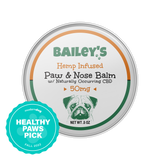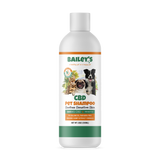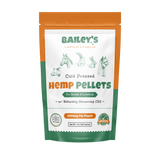Fish Sticks for Dogs: Safe or Risky?

Fish sticks for dogs have become increasingly popular as a treat or addition to their regular diet. Pet owners often wonder if feeding fish sticks to their canine companions is a safe and healthy choice.

The friendly folks at Bailey’s CBD are here to guide us as we discuss the basics of dog nutrition, the ingredients and nutritional value of fish sticks, the potential benefits and risks associated with feeding them to dogs, and alternative options to consider. By understanding the facts, pet owners can make informed decisions about including fish sticks in their dog's diet.
Table of Contents
1. Understanding the Basics of Dog Nutrition
Dogs, like humans, require a balanced diet to maintain good health and overall well-being. A healthy and nutritionally complete diet for dogs consists of various essential nutrients that support their growth, energy levels, and bodily functions.
When it comes to dog nutrition, it's important to understand the role of essential nutrients. These nutrients include proteins, carbohydrates, fats, vitamins, and minerals. Each nutrient plays a specific role in the dog's body, and a deficiency in one or more nutrients can lead to health problems.
1.1 Essential Nutrients for Dogs
Let's take a closer look at each essential nutrient and its importance in a dog's diet:
Proteins:
Protein is an essential component of a dog's diet as it is crucial for building and repairing body tissues, supporting the immune system, and providing energy. Dogs require a sufficient amount of high-quality protein to thrive. Good sources of protein for dogs include meat, fish, eggs, and dairy products.
Carbohydrates:
Carbohydrates are an important source of energy for dogs. They provide the fuel needed for physical activities and help maintain proper brain function. Common sources of carbohydrates in a dog's diet include grains, vegetables, and fruits.
Fats:
Fats are another essential nutrient for dogs. They play a vital role in providing energy, maintaining healthy skin and coat, and supporting various bodily functions. Healthy sources of fats for dogs include fish oil, flaxseed oil, and chicken fat.
Vitamins:
Vitamins are necessary for a dog's overall health and well-being. They help regulate various bodily functions and support the immune system. Some important vitamins for dogs include vitamin A, vitamin D, vitamin E, and B vitamins.
Minerals:
Minerals are essential for maintaining strong bones and teeth, regulating body fluids, and supporting various metabolic processes. Important minerals for dogs include calcium, phosphorus, iron, zinc, and selenium.
It's worth noting that the specific nutritional needs of dogs may vary depending on factors such as age, breed, size, and activity level. Consulting with a veterinarian can help determine the best diet plan for your furry friend.
2. What are Fish Sticks?
Fish sticks are a popular human food made from fish fillets that are breaded and fried. They are often consumed as a quick and convenient snack or meal option. The crispy exterior of the fish sticks provides a satisfying crunch, while the tender and flaky fish inside offers a burst of flavor. Fish sticks are commonly enjoyed with tartar sauce or ketchup, adding a tangy and savory element to each bite.
Originating in the United States in the 1950s, fish sticks quickly gained popularity due to their affordability and ease of preparation. They became a staple in many households, offering a delicious and hassle-free option for busy families. Over the years, fish sticks have evolved, with various brands and recipes offering different flavors and textures to cater to diverse palates.
While fish sticks are primarily marketed towards humans, some pet owners are curious about whether dogs can also enjoy them. It's important to note that while fish sticks may seem tempting to share with our furry friends, it's crucial to consider their specific dietary needs and consult with a veterinarian before introducing any new food into their diet.
2.1 Common Ingredients in Fish Sticks
The ingredients in fish sticks may vary depending on the brand and recipe. However, common ingredients include fish fillets, breading (made from flour or breadcrumbs), salt, and various seasonings or additives. The fish fillets used in fish sticks are typically white fish varieties such as cod, haddock, or pollock. These fish are known for their mild flavor and delicate texture, making them ideal for breading and frying.
The breading used in fish sticks plays a crucial role in creating the crispy exterior that is characteristic of this popular dish. It can be made from a combination of flour, breadcrumbs, or a mixture of both. The breading not only adds texture but also helps to seal in the moisture of the fish, ensuring a juicy and flavorful bite.
In addition to the basic ingredients, some brands may incorporate additional seasonings or additives to enhance the taste of their fish sticks. These can include herbs, spices, garlic powder, onion powder, or even a hint of lemon zest. These added flavors contribute to the overall sensory experience of enjoying fish sticks.
2.2 Nutritional Value of Fish Sticks
Fish sticks are a source of protein and can also provide essential omega-3 fatty acids, which have been associated with various health benefits in both humans and animals. Protein is an essential macronutrient that plays a crucial role in building and repairing tissues, supporting the immune system, and maintaining healthy hair, skin, and nails.
The omega-3 fatty acids found in fish sticks, particularly in the fish fillets used, have been linked to heart health, brain function, and reducing inflammation in the body. These beneficial fats are known to support cardiovascular health by reducing the risk of heart disease and maintaining healthy cholesterol levels.
However, it's important to note that the nutritional value of fish sticks can vary depending on the brand and cooking method. Some brands may use higher-quality fish fillets and healthier breading options, while others may contain more additives and preservatives. It's always a good idea to check the nutrition label and choose fish sticks that align with your dietary preferences and health goals.
3. Potential Benefits of Fish Sticks for Dogs
Feeding fish sticks to dogs can offer potential benefits, particularly in terms of providing omega-3 fatty acids and serving as a protein source.
Omega-3 fatty acids, such as EPA and DHA, are beneficial for dogs as they support healthy skin and coat, promote joint health, aid in cognitive function, and have anti-inflammatory properties. The dog's body does not produce these essential fatty acids so it is important to include them in their diet. Fish sticks, made from fish rich in omega-3 fatty acids like salmon or sardines, can be a convenient way to ensure that your furry friend gets an adequate amount of these beneficial nutrients.
In addition to omega-3 fatty acids, fish sticks can also serve as a protein source for dogs. Protein is essential for the growth, repair, and maintenance of tissues in the body. It plays a crucial role in building strong muscles, supporting the immune system, and aiding in the production of enzymes and hormones. Fish sticks, when made from high-quality fish fillets, can provide dogs with a lean and easily digestible source of protein.
Fish sticks can be particularly beneficial for dogs with specific dietary needs or allergies. Some dogs may have sensitivities or allergies to common protein sources like chicken or beef. In such cases, fish sticks can offer an alternative protein option that is less likely to trigger an allergic reaction. However, it's important to ensure that the fish sticks you choose are made from high-quality fish fillets without any harmful additives or excessive sodium content. Reading the ingredient list and choosing reputable brands can help ensure that you are providing your dog with a nutritious and safe protein source.
When introducing fish sticks into your dog's diet, it's important to do so gradually. Start by offering a small amount and monitor your dog's response. Some dogs may have sensitivities to fish or may not tolerate certain ingredients in the fish sticks. If you notice any adverse reactions such as vomiting, diarrhea, or skin irritations, discontinue feeding fish sticks and consult with your veterinarian.
4. Risks Associated with Fish Sticks for Dogs
While fish sticks can offer potential benefits, there are also risks that pet owners should be aware of before incorporating them into their dog's diet.
When it comes to our furry friends, we always want to make sure we are making the best choices for their health and well-being. While fish sticks may seem like a convenient and tasty option for dogs, it's important to consider the potential risks involved.
4.1 Salt Content in Fish Sticks
One concern with fish sticks is their salt content. Excessive salt intake can lead to dehydration, electrolyte imbalances, and other health issues in dogs. Dogs have different dietary needs compared to humans, and their bodies are not equipped to handle high levels of sodium.
It's crucial for pet owners to choose low-sodium options or to limit the amount of fish sticks given to their dogs. Reading the labels and checking the nutritional information can help you make an informed decision. Remember, moderation is key when it comes to any treat or addition to your dog's diet.
4.2 Potential Allergies and Intolerances
Some dogs may have allergies or sensitivities to certain types of fish or ingredients commonly used in fish sticks. Just like humans, dogs can develop allergies over time, and it's important to be vigilant about any adverse reactions.
It is important to monitor your dog for any adverse reactions such as itching, gastrointestinal upset, or difficulty breathing. These symptoms could be signs of an allergic reaction or intolerance to a specific ingredient in the fish sticks. If any symptoms occur, it is best to discontinue feeding fish sticks and consult a veterinarian for further guidance.
Additionally, it's worth noting that fish sticks may contain other additives or preservatives that could potentially be harmful to dogs. Always check the ingredient list and avoid any fish sticks that contain artificial flavors, colors, or other questionable additives.
While fish sticks can be a convenient and tasty treat for dogs, it's important to consider the potential risks involved. By being mindful of the salt content, potential allergies, and other additives, you can make an informed decision about whether or not to include fish sticks in your dog's diet. Remember, when it comes to your furry friend's health, it's always better to be safe than sorry.

5. Alternatives to Fish Sticks for Dogs
If pet owners are concerned about the potential risks associated with fish sticks or are looking for alternative options, there are several alternatives to consider.
5.1 Homemade Fish Recipes for Dogs
One alternative is to prepare homemade fish-based meals or treats for dogs. This allows pet owners to have control over the ingredients and ensures that their dogs are getting a nutritious and balanced diet.
5.2 Commercially Available Fish-Based Dog Food
Another option is to explore commercially available fish-based dog food. Many reputable pet food manufacturers offer well-balanced options that are specifically formulated to meet the nutritional needs of dogs.











